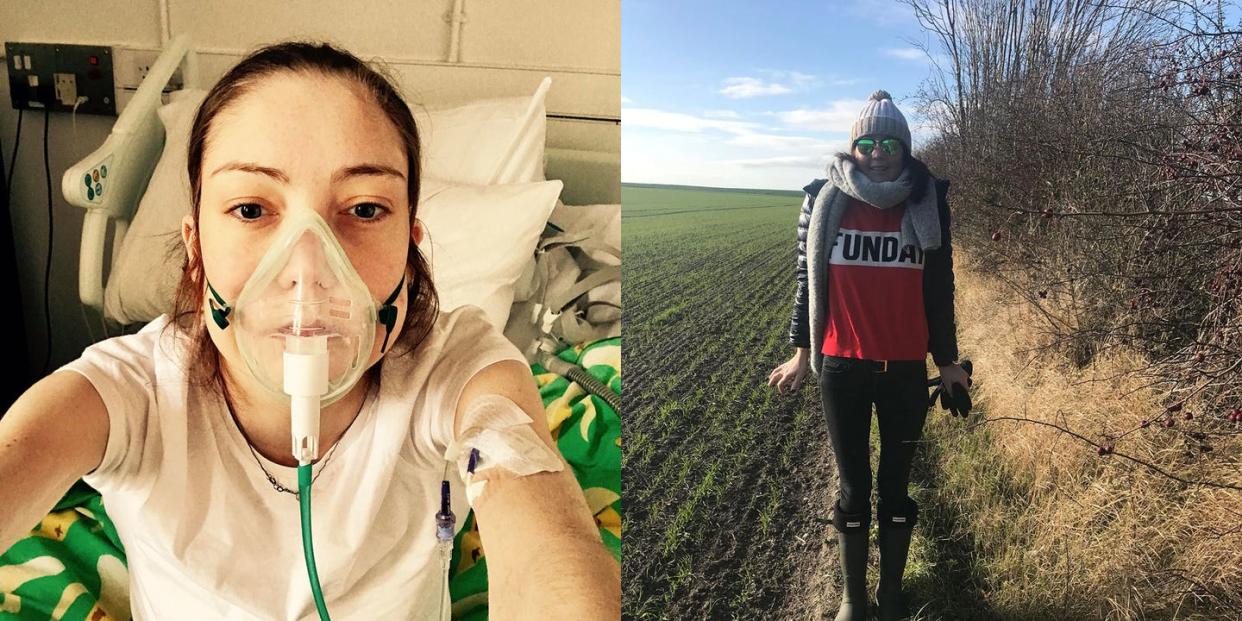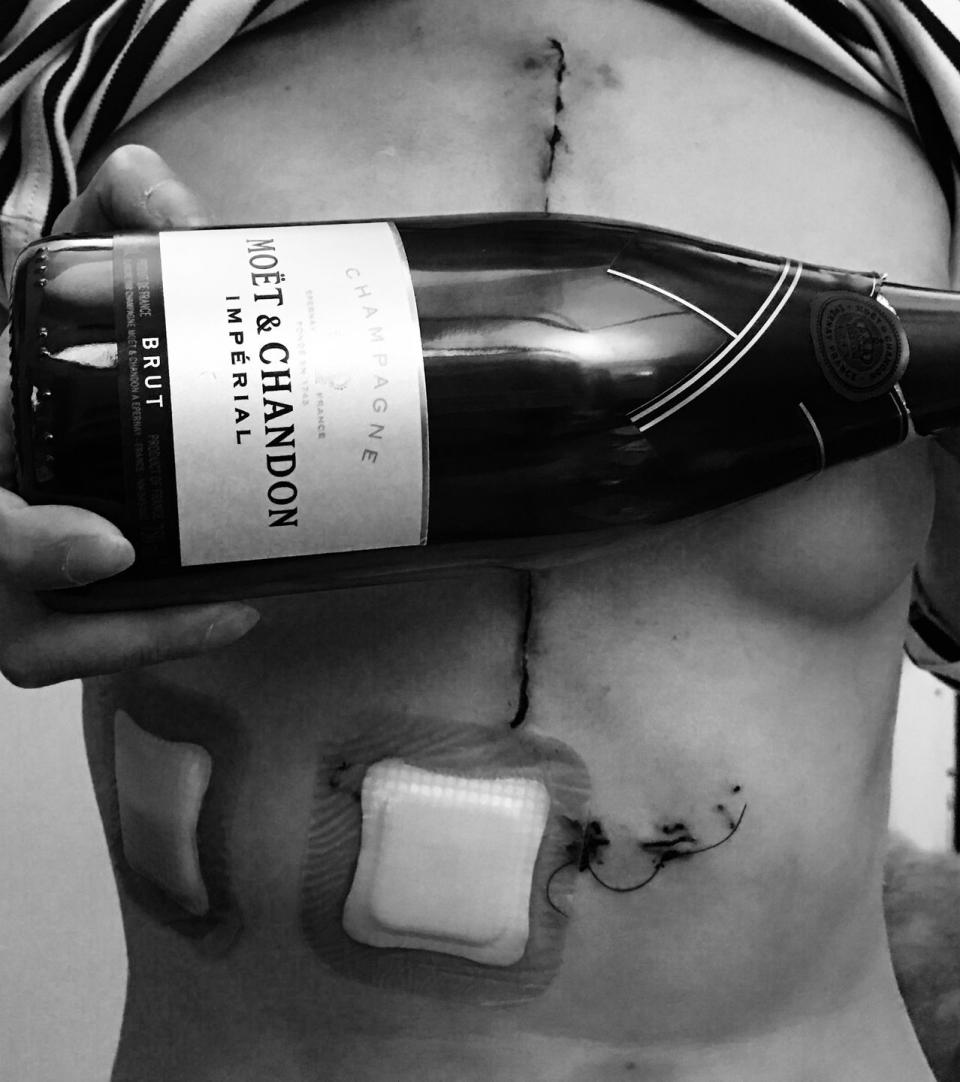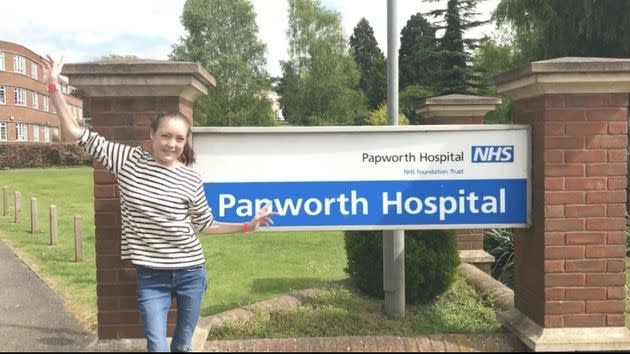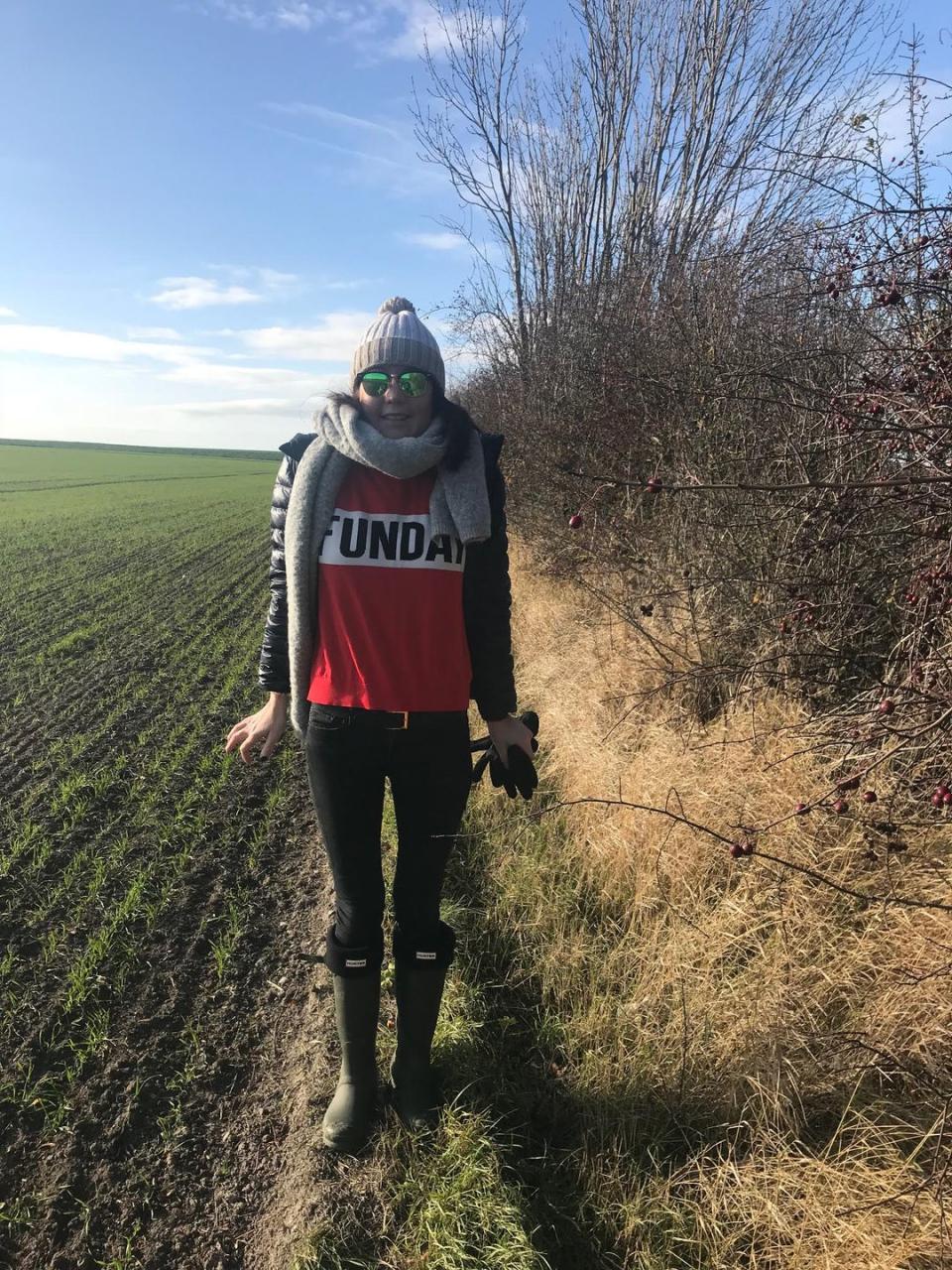When you live because someone else died: "I had a double lung transplant in my twenties"

Pippa Kent, 28, was born with Cystic Fibrosis, a degenerative genetic disease affecting the functionality of her lungs and her pancreas. Despite living a relatively normal life for most of her twenties, living in London and working in communications for the government, at 27 the health of her lungs began to rapidly decline and she was left urgently needing a double lung transplant in order to survive. This is her story…
"I didn’t always know I’d need a lung transplant; they aren’t inevitable for everyone with Cystic Fibrosis (CF), and they’re also not viable for everyone, so it wasn’t a given. I was diagnosed when I was about two years old and for most of my childhood and in my early twenties I was pretty healthy.
Because of CF, my lungs would get a build-up of sticky mucus inside them which meant I’d contract more infections than most people which were harder to shift. Over time, my lungs became damaged; they got scarred and became less able to process oxygen. The other side of the disease is a pancreatic deficiency, meaning my pancreas doesn’t produce the enzymes it needs to break down food, so I have to take enzymes every time I eat.

In 2016 I started to notice that I was gradually becoming less able to live a normal life, and made the big decision to go on the list for a transplant. By that point, I wasn’t in dire need of one, but quite often people have to wait a long time for a donor - sometimes around two years - so I had to calculate that into the time.
For some people, the decline from not really needing a transplant to needing one urgently is quite a slow one, but that wasn’t the case for me. In February 2017, three months after going on the list, I got very ill very quickly. I contracted an infection, but because of all the chest infections I’d had over the years, I’d built up a resistance to antibiotics. I was hospitalised and put on oxygen, but when none of the medication worked, doctors weren’t sure whether I would make it. My sister, who was travelling in South America at the time, was asked to come home.
Thankfully, after a few weeks doctors found some antibiotics that did a little bit of good, but I was taken off the transplant list because I wouldn’t have survived the surgery. I spent until early April in hospital, still on oxygen and unable to do very much, just trying to build up some strength to get rid of as much infection as possible. After three months in hospital they put me back on the transplant list and sent me back home with the view that there wasn’t much else they could do except wait for a donor organ.
The transplant list is based on urgency, but there’s also a whole complicated metric including blood type and organ size that decides who’s allocated one. A lot of it comes down to chance, and that made the waiting even more difficult. It was exhausting not knowing, having to play this morbid waiting game. We went through some pretty dark times; we talked about how I might want my funeral, and where I might want to be buried. The reality of it was that if I didn’t get a transplant pretty quickly then I would die. It’s not uncommon for people to die on the list. We tried to be positive, hoping it wouldn’t happen, but they were conversations that were scary to have.
You’re given a special mobile phone when you get put on the list, which only the hospital has the number for. I went back as an active person on the list on the Monday, and I got the call to have my transplant on the Friday. I couldn’t believe it happened so quickly; I felt relieved, terrified, but also quite calm because I didn't know for certain that it would definitely go ahead. Lots of people have false alarms when doctors decide the organ they were going to transplant isn’t actually viable for any number of reasons. They’ll only put in organs that are perfect.

We drove straight to the hospital, arriving at 6pm. By 10pm they had confirmed it was all going ahead, and by 10.30pm I was lying on the operating table. There wasn’t really much time for me to worry.
By 3pm the following day, I came around in intensive care (ICU). I was high as a kite on all my medication, writing demanding notes about things I wanted because I was unable to speak. Within 15 minutes of waking up, they moved me from my bed and into a chair, which was terrifying, but they encourage you to move around and to progress at a fast pace so everything can start working again properly.
Three days after my transplant, I was moved out of intensive care and into the main ward. The next day I was walking around the ward unaided, carrying around my drip as I went. I was on a cycle bike by day 6, and on day 13 I went home. Breathing properly again felt physically very different, it was such a relief.

The main risk of an organ transplant is your body rejecting it. You take anti-rejection medicines which help, but the reality is that at some point your body will go into rejection. Some people have organ rejection within a few weeks of transplant, others have it within a year. Some people have lived post-transplant for 30 or 40 years. I hope I’m still kicking around at 70 or 80, but that depends on science having developed the anti-rejection medicines by then to make them more effective.
After my surgery I felt relieved and excited to get back to my normal life, but I also started struggling with my mental health. Before my transplant I’d always kept my CF very separate, not wanting to identify myself as someone who was unwell, but I had been so ill over the previous few months that it had become all-consuming. It was hard not to let it define me. I started suffering from health anxiety, irrationally panicking that things didn’t feel ‘right’ and convincing myself there was something wrong. But I didn’t want to spend my whole life back at the hospital being checked out, I wanted to get on with things, so I’ve had to learn when it’s right to worry, and when I just need to take a step back and rationalise.
A few months after my transplant, however, I began having problems eating and getting stomach pains. They initially thought I had a stomach ulcer, but after some more tests they actually found out I had cancer. I had developed post-transplant lymphoma in my stomach – there’s a small risk of developing it post-transplant, and an even smaller risk of developing it following a lung transplant specifically – and it had progressed to stage 4. When the doctors told me, my mind instantly went to the worst place. I thought that was it; I was only a few months post-transplant, my body was in a weakened state and, having gone through so much already, I thought I would die.
Luckily, the cancer was treatable with a medication called Rituximab which meant I didn’t need to have chemotherapy. I went through four months of treatment which gave me minimal side effects, and I got the all clear shortly after Christmas. I’m just lucky I guess.
While things seem to have stabilised with my health, there are some major changes I’ve had to adapt to as a result of my lung transplant. I have to follow a special diet because I’m immunosuppressed, meaning I can no longer eat rare meat, blue cheese, runny eggs, unwashed fruit and veg, and lots more. As a real foodie – I worked for years in food and drink PR before moving to work for the government – I found it so hard. Food was such a big part of my life that I didn’t want to have to lose that because of these constraints.

But everywhere I looked, I couldn’t seem to find any inspiration or advice on what to cook. I was shocked; it’s not just people who’ve had transplants who have to follow an immunosuppressed diet. People who have Crohn’s disease, rheumatoid arthritis, are undergoing chemotherapy and other things are all advised to follow it too, but there was nothing much out there on it. So I decided to put together a cookbook myself. Using old work contacts, I managed to round up over 90 well-known chefs and restaurants to donate specific, immunosuppressed-diet-friendly recipes following guidance from the dietitian team at my hospital, and I found myself an agent to get it published. But the reality was that for all the big publishers, it wasn’t as commercially viable as most of the other cookbooks they release by famous chefs, and it just wasn’t worth that risk for them.
So instead, we found a smaller publishing house who agreed to publish our cookbook pro bono, giving all the money that they would have charged us to charity - but only if we could fundraise enough to do the printing, design and distribution. Earlier this year, we launched a Kickstarter campaign, where we need to raise £58,00. But after months of campaigning we sadly didn't raise the amount we needed. Now I am exploring other options to create this book which could help thousands of people across the UK and beyond. I want the book to come out as a lasting legacy, and as a major positive out of what has been a very tough year. I want it to be something that could be really useful for people in years to come.
I also think I so desperately want the cookbook project to succeed somehow because I feel a bit of a weight to make the most of my second chance. If I was the one to receive the lungs, then I should make the most out of them. The waiting list for organs is huge and without more people donating, there will be people who die on the list. I was lucky enough not to be one of those people, and there’s a responsibility that comes with that.
I would love more people to sign up to donate their organs. Some people are strongly against it and I completely understand; I can see that there are reasons why people justify their organs remaining within them after they’ve died, and it’s their personal choice. But the issue is that for the people who would be open to donating their organs, they often don’t get round to putting themselves on the register.

Being a donor, you could save up to nine lives after you’ve died with organs that are otherwise useless. They’re going to be burnt or buried. To me, it means the person goes on living in some way. Wouldn’t it be nice to think that someone else could live because you had died? That nine other people could possibly live because you had died. There’s something magical about that."
There are currently 5932 people on the transplant waiting list, including 339 people waiting for a lung transplant.
Last year, 470 people died waiting for a transplant or within one year of removal from the waiting list, including 65 people who were waiting for a lung transplant. A further seven people died waiting for a combined heart/lung transplant.
The median waiting time for a lung transplant for an adult is 255 days.
In the year 2017, 201 people received a lung transplant. A further 12 received a combined heart/lung transplant.
Last year, 1575 people became deceased donors, the highest ever number.
An NHS Blood and Transplant spokesman told Cosmopolitan UK: "We’re so grateful for Pippa’s support. More and more families are saving lives through supporting organ donation. We need to stress that the deadly shortage of organ donors remains. Around three people who could benefit from a donated organ still die a day. Please, tell your family you want to donate, and join the NHS Organ Donor Register."
Follow Cat on Twitter.
('You Might Also Like',)

